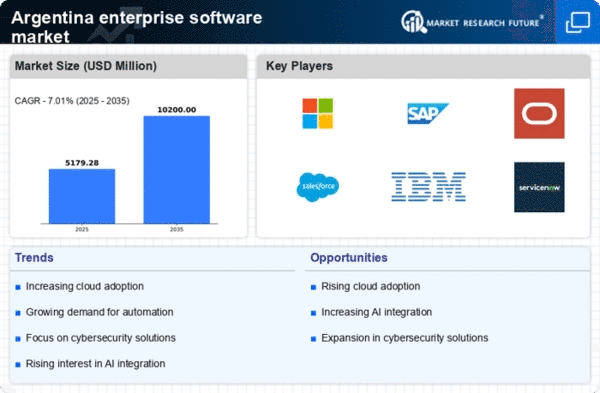Digital Transformation Initiatives
The enterprise software market in Argentina is experiencing a surge due to ongoing digital transformation initiatives across various sectors. Organizations are increasingly investing in software solutions to enhance operational efficiency and improve customer engagement. In 2025, it is estimated that approximately 70% of companies in Argentina will prioritize digital transformation, leading to a heightened demand for enterprise software. This shift is driven by the need to adapt to changing market dynamics and consumer expectations. As businesses seek to modernize their processes, the enterprise software market is projected to witness significant growth, with a projected increase in revenue reaching $1.5 billion by the end of the year.. This trend underscores the critical role of software in facilitating organizational agility and competitiveness.
Regulatory Compliance Requirements
In Argentina, the enterprise software market is significantly influenced by stringent regulatory compliance requirements. Companies are compelled to adopt software solutions that ensure adherence to local laws and regulations, particularly in sectors such as finance and healthcare. The need for compliance management systems is becoming increasingly apparent, as non-compliance can result in substantial fines and reputational damage. As of November 2025, it is estimated that around 60% of enterprises will invest in compliance-focused software, reflecting a growing awareness of the importance of regulatory adherence. This trend not only drives demand for enterprise software but also encourages vendors to develop tailored solutions that address specific compliance challenges faced by businesses in Argentina.
Remote Work and Collaboration Tools
The rise of remote work has profoundly impacted the enterprise software market in Argentina. As organizations adapt to flexible work arrangements, there is a growing need for collaboration tools that facilitate communication and project management among distributed teams. By November 2025, it is projected that over 50% of companies will implement enterprise software solutions designed to enhance remote collaboration. This shift is likely to drive innovation in software development, with a focus on features that support virtual teamwork and productivity. The enterprise software market is expected to benefit from this trend, with an estimated growth rate of 15% annually as businesses seek to optimize their remote work capabilities.
Integration of Emerging Technologies
The integration of emerging technologies is a key driver of growth in the enterprise software market in Argentina. As businesses seek to leverage advancements such as artificial intelligence, machine learning, and the Internet of Things, there is a corresponding demand for software solutions that can seamlessly integrate these technologies into existing systems. By November 2025, it is projected that around 40% of enterprises will prioritize investments in software that supports the integration of emerging technologies. This trend indicates a shift towards more sophisticated software solutions that enhance operational capabilities and drive innovation. The enterprise software market is likely to expand as organizations recognize the competitive advantages offered by such integrations.
Focus on Data Analytics and Business Intelligence
The enterprise software market in Argentina is increasingly characterized by a focus on data analytics and business intelligence solutions. Organizations are recognizing the value of data-driven decision-making and are investing in software that provides insights into operational performance and customer behavior. By the end of 2025, it is anticipated that approximately 65% of enterprises will adopt analytics tools to enhance their strategic planning and operational efficiency. This trend is likely to stimulate growth in the enterprise software market, as vendors develop advanced analytics capabilities that cater to the specific needs of Argentine businesses. The emphasis on data analytics not only supports informed decision-making but also fosters a culture of continuous improvement within organizations.
















